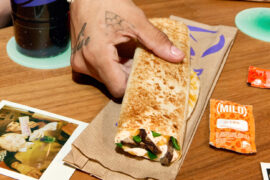An investigation into a food safety scandal in China last month that impacted business for a number of quick service restaurant chains and convenience stores in the PRC and Japan has found no evidence that spoiled meat was exported to Japan, Chinese food safety regulators announced on August 6.
Chinese authorities came to this conclusion after reviewing video recordings from cameras at Shanghai Husi Food Co.’s production lines, officials from Japan’s Health, Labor and Welfare Ministry told members of the press following a meeting with their Chinese counterparts in Beijing.
The company, Chinese regulators said, manufactured frozen products intended for domestic and export markets at different times and stored them separately, thus preventing cross-contamination. However, it was noted that factory workers did produce both lots on the same lines.
“The talks [among Chinese and Japanese officials] followed revelations in July that Shanghai Husi sold expired and spoiled products to popular fast food chains and convenience stores, including McDonald’s and KFC Corp.,” reported the Kyodo news service. “Chinese investigative journalists revealed the company’s brazen use of bad meat, going undercover to film the filthy conditions under which it produced such popular products as chicken nuggets and beef patties.”
Following the revelations, Japan suspended imports from Shanghai Husi. Tokyo-headquartered McDonald’s Holdings Company (Japan), Ltd. announced the prohibition of sale of all products containing chicken meat from China, adding that it had switched overseas sourcing completely to Thailand.
While the fast food chain’s restaurants stopped menuing products made with meat imported from Shanghai Husi, which reportedly had supplied approximately one-fifth of the Chicken McNuggets sold in Japan, the scare was blamed for a 15% downturn in McDonald’s July sales results in Japan.
In China, where McDonald’s operates more than 2,000 restaurants, burgers and chicken products were taken off the menu for about two weeks. This week they are reportedly being made available to customers again in Beijing and Guangzhou, while the resumption of a full menu in Shanghai is not expected until later this month.
“We will go back to the origin of the food…so it will take a longer time, and is not as easy as people may think,” said a McDonald’s spokesperson. “We are doing a very stringent inspection to make sure the food meets the government’s requirement and McDonald’s standards.”
Yum Brands Inc. (parent of KFC and Pizza Hut, with approximately 6,400 restaurants in the PRC), which also sourced product from Shanghai Husi, said last month that the food safety scare has caused “significant negative” damage to sales at its restaurants in China.
Meanwhile, Chinese police have reportedly taken six executives of Shanghai Husi into custody.
“Yum China has decided to immediately terminate all procurement from OSI China,” including Shanghai Husi,” Yum said in a statement shortly after arrests were made.
Sheldon Lavin, chairman and chief executive officer of Aurora, Illinois-headquartered OSI Group LLC, apologized to the company’s China customers in a statement on July 23, underscoring that it is taking measures to address the problems.
“What happened at Husi Shanghai is completely unacceptable,” he said. “We will bear the responsibility of these missteps, and will make sure that they never happen again.”
McDonald’s, maintaining its relationship with OSI Group, reportedly said it would transfer procurement for meat products in markets previously supplied from the Shanghai plant to Husi’s new factory in the province of Henan. Until production there is sufficiently geared up to meet demand, it will also source food from Husi’s factory in the province of Hebei.





